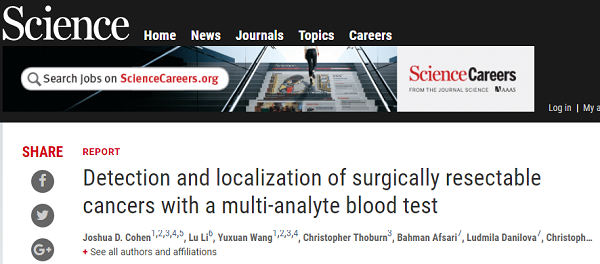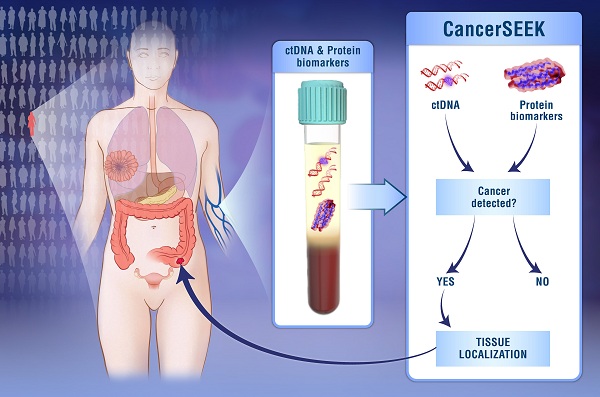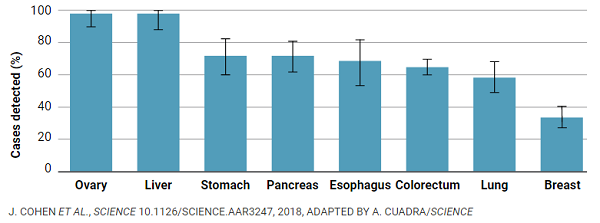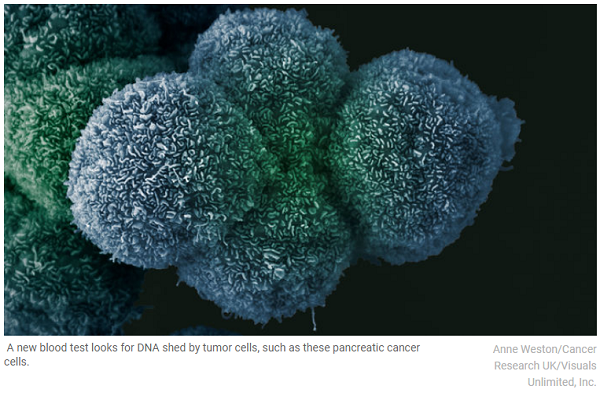Release date: 2018-01-22
A preliminary study suggests that one day, a blood test may be used to detect various cancers! In the latest breakthrough in Science magazine, scientists from institutions such as Johns Hopkins University have developed a blood test that can be used to screen eight common cancers and help identify cancer sites. .

This method, called CancerSEEK, is a unique, non-invasive, multi-analytical test that simultaneously assesses the level of cancer proteins and the presence of cancer gene mutations in blood circulating DNA.
Joshua Cohen, the first author of the paper, said: "Circulating tumor DNA mutations are highly specific markers of cancer. To take full advantage of this inherent property, we have tried to develop a mutation that detects at least one of the most cancers. Small, strong panel."
Initially, the researchers investigated hundreds of genes and 40 protein markers, eventually reducing the number to 16 genes and 8 proteins. Dr. Nickolas Papadopoulos, co-author of the paper and a professor of oncology and pathology, said: "The combination of specific biomarkers in early cancer detection may change the way cancer is screened."

CancerSEEK is a unique noninvasive, multi-analyte blood test that detecting and localizes eight common cancer types. Credit: Elizabeth Cook and Kaitlin Lindsay
Beautiful result
In the study, scientists tested CancerSEEK in 812 healthy controls and found that only 7 (1%) false positive results were produced; specificity was over 99%.
Professor Kenneth Kinzler, co-author of the paper, said: "High specificity is necessary because false positive results can expose patients to unnecessary invasive follow-up tests (to determine if cancer is present)."
At the same time, the researchers evaluated CancerSEEK in 1,005 non-metastatic patients with stage I to III ovarian cancer, liver cancer, stomach cancer, pancreatic cancer, esophageal cancer, colorectal cancer, lung cancer or breast cancer. The results showed that the median overall sensitivity of the test or the ability to detect cancer was 70%. The effectiveness of CancerSEEK varies from cancer to cancer: it detects 98% of ovarian cancer, while breast cancer only detects 33%.

Dr. Cristian Tomasetti, an associate professor of oncology and biostatistics who led the study, said: "The novelty of the test is that, in order to make the final judgment, it combines the results of DNA mutations and analysis of multiple protein levels. Another innovation is , CancerSEEK uses machine learning to accurately determine the location of the tumor in 83% of patients."

Peer questioning: still need time verification
Alberto Bardelli, a cancer researcher at the University of Turin in Italy who did not participate in the study, said: "The smartest part of the technology is the combination of DNA and protein."
Science reported in a news update on the day of the paper that the study took a big step in the hottest cancer blood test.
However, for this outcome, molecular pathologist Anirban Maitra of the MD Anderson Cancer Center gave some questions. They believe that, on the one hand, cancer-related proteins used by CancerSEEK reflect tissue damage and also occur in patients with inflammatory diseases such as arthritis; on the other hand, 1005 patients in the study already have cancer symptoms, CancerSEEK In asymptomatic patients (their tumors may only shed less DNA) may not be as effective. In this study, CancerSEEK only found 43% of very early cancers (stage I).
Other scientists working on liquid biopsy say they want to figure out whether it is time to reduce cancer deaths without causing harm by extensively screening a healthy population with a universal blood test.

A more sensitive blood test could one day detect early stages of cancers including ovarian cancer (pictured).Credit: Eye of Science/SPL
There is more research: involving 50,000 women
However, the scientists who led the study said that Cancer-SEEK is ready to be tested as a screening tool. They believe that a test does not have to be perfect to be useful.
Professor Bert Vogelstein, co-author of the paper, said: "Today, many of the most promising cancer therapies are only beneficial to a small number of cancer patients, but we still think they are a major breakthrough. We need to realize that it is difficult to have any kind of test that can be used. For detecting all types of cancer."
Researchers have now begun a larger study of Cancer-SEEK to investigate whether they can detect tumors in seemingly cancer-free women. The $50 million, five-year study will investigate how many 50,000 women (aged between 65 and 75). The Marcus Foundation, a private charity, funded the research.
The ultimate goal: simpler and cheaper
Dr. Anne Marie Lennon, co-author of the paper, said: “CancerSEEK may have a major impact on patients. Early detection of cancer can provide a variety of ways to improve patient outcomes. Ideally, cancer can be detected very early. And then it can be cured only by surgery."
Currently, the research team is applying for a patent for CancerSEEK. They emphasized that a test that was used for routine cancer screening must be consistent with or lower than the cost of currently available screening for single cancer tests (such as colonoscopy). They estimate that the final cost of CancerSEEK will be less than $500/sample ($500 per sample). Researchers hope that their work will eventually lead to tests that are simpler and cheaper than some other liquid biopsies.
Reference materials:
Single blood test screens for eight cancer types
'Liquid biopsy'promises early detection for cancer
Simple blood test detects eight different kinds of cancer
Source: Bio-Exploration
Jet Hydrant,Automatic Hydrant Water Cannon,Jet Fire Extinguishing System,Jet Hydrant Water Cannon
LIAONING YINGKOU TIANCHENG FIRE PROTECTION EQUIPMENT CO.,LTD , https://www.tcfiretech.com